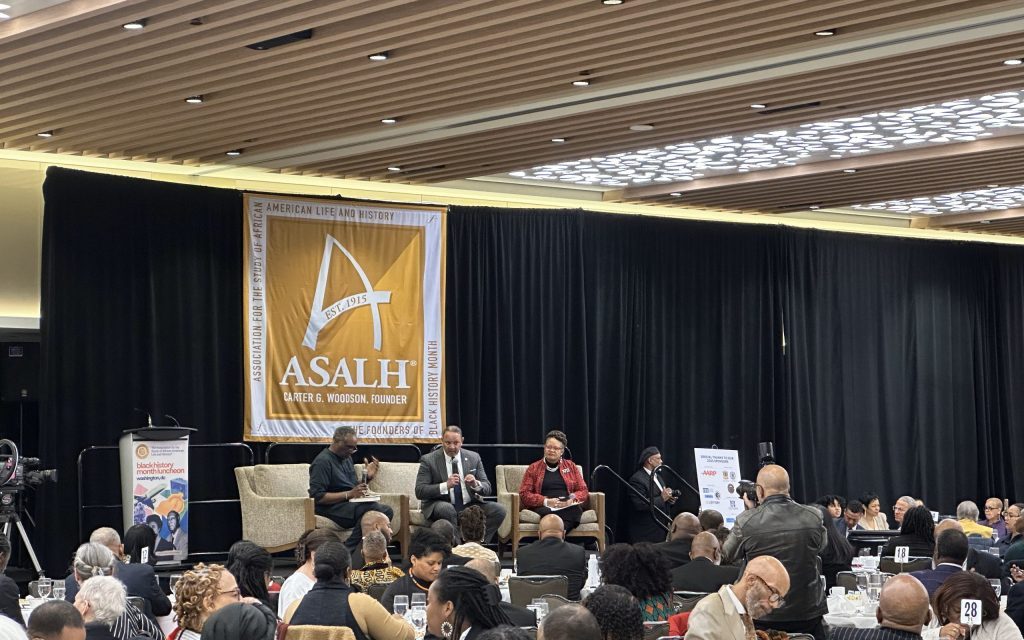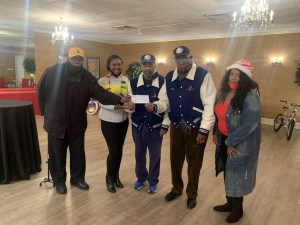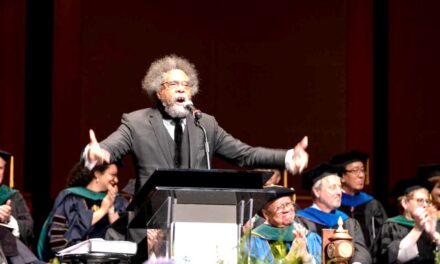By Megan Sayles
AFRO Staff Writer
msayles@afro.com
The Association for the Study of African American Life and History (ASALH) held its 99th Annual Black History Luncheon in Washington D.C. on Feb. 22. The gathering carries on the legacy of the organization’s founder, Dr. Carter G. Woodson, who established Negro History Week in 1926. Woodson’s goal was to highlight the often unnoticed accomplishments and contributions of Black people. Eventually, the concept caught on and, later, evolved into Black History Month in 1976.
Dr. Karsonya “Kaye” Whitehead, president of ASALH, spoke to attendees, welcoming them to the event, which has long served as a space to replenish the strength needed to fight for human and civil rights throughout the year.
“We descend from people who chose to survive,” said Whitehead. “We, as Black people, have survived so much in the country. We survived the Middle Passage and we survived slavery. We survived the whips and we survived the lashes. We survived our families being separated and our children being taken away from us. We survived coming out of the Civil War…we survived Jim Crow.”

(AFRO Photo / Alexis Taylor)
“We survived the lynchings and the burnings and the crosses on our yards. We survived them killing all of our leaders,” she continued. “We survived anyway…We survived all of that and we are still standing on the other side. Because we have survived all of this, we will survive this moment.”
This year’s Black History Month theme honored African Americans and labor, illuminating how both free and enslaved Black people played major roles in building key industries, fueling economic activism and organizing the country’s labor unions.
The luncheon took place at a time where federal agencies and private companies alike ban diversity, equity and inclusion (DEI) on the federal level and slash the federal workforce with mass lay-offs. It featured a panel conversation with Dr. Greg Carr, department chair for Afro-American studies at Howard University; Marc H. Morial, president and CEO of the National Urban League; and Christine Sampson-Clark, executive committee member of the National Education Association (NEA).
“In this town, we see hard-working civil servants, who’ve given their lives and careers, being indiscriminately thrown to the side,” said Morial during the panel. “We see threats to undermine those agencies within the government that were the fruits of the movement, like the Civil Rights Division of the Justice Department, the Equal Employment Opportunity Commission and the Department of Labor that held federal contractors accountable.”
Morial took time to shed light on Black workers’ historical impact on the fight for racial justice.
Following the 1896 Plessy V. Ferguson Supreme Court decision, which upheld the constitutionality of racial segregation, professional associations played an integral role in organizing for civil rights. This included advocating for better working conditions for Black laborers.
One organization was the Brotherhood of Sleeping Car Porters, the first all-Black labor union in the U.S. Led by A. Philip Randolph, the union called for better treatment of African-American railroad porters and maids.
Morial said the current actions from the White House are an attempt to reverse the progress that these advocates fought and, at times, died for. He encouraged Black people today to follow in the footsteps of their ancestors.
“Understand this is an attack on civil rights and on progress,” said Morial. “It’s bigger than firing employees and attacking DEI and transgender people, it’s an attack on the last 70 years. We have a generational responsibility— to our children and our children’s children— to do everything we can to slow it down and stop it.”
The luncheon featured Ebony McMorris, the White House correspondent for Urban Radio Networks, as mistress of ceremonies. The audience also heard from Mary Frances Berry, the Geraldine R. Segal Professor of American Social Thought, History, and Africana Studies emerita at the University of Pennsylvania, and author of the book “Slavery After Slavery.”
AARP was a cultural sponsor for the luncheon, choosing to stand by their diversity, equity and inclusion initiatives as other major companies back away. The men of Omega Psi Phi Fraternity, Inc.’s Third District served as heritage level sponsors, along with members of Omega Psi Phi Fraternity, Inc.’s Life Membership Foundation. Members of the fraternity gave a total of $20,000 in funds to ASALH at the luncheon.
History level sponsors included the National Education Association, John Ashley, Blacks in Government and the D.C. Lottery. The African American Museum in Philadelphia also helped bring the event to fruition as a preservation level sponsor, with the Bernie L. Bates Foundation, Anthony Cade; Edna Medford; the Menkiti Group and Keller Williams Capital Properties sponsoring at the hero level. Valerie Mahomes and Northern Virginia Wealth Management donated on the festival level.
Both the AFRO American Newspapers and the Washington Informer served as media sponsors for the luncheon.
The program was sure to include youth, as 15-year-old Sarea Manson, a sophomore at Woodson High School, delivered a rendition of James Weldon Johnson’s “Lift Every Voice and Sing.” There was also a tribute to the parents of Myles Amadi Gresham, a former ASALH volunteer, who was killed on April 25, 2024 at the age of 22.
Throughout the event, attendees were reminded of the importance of ASALH’s mission: creating and disseminating knowledge about Black history.
Lonnie G. Bunch III, the 14th secretary of the Smithsonian, expanded on the need for the organization’s work.
“There is nothing more dangerous than a nation that forgets, and it’s often African-American culture that’s been forgotten. ASALH makes sure that people will understand that this history shapes us all,” said Bunch. “While it’s stories about African Americans, it’s really the quintessential American story. What ASALH helps us realize is that all of us are shaped by the notions of spirituality, optimism and hope that come out of the African-American community.”
In a time where the teaching of Black history is increasingly being censored, challenged and restricted, this mission becomes even more crucial.
“The notion of erasing history is a real problem,” said Bunch. “It is incumbent upon those of us who care to raise the issue and make sure the books are out and the presentations are there because this history is too important to be erased.”
The post ASALH hosts 99th Annual Black History Luncheon in honor of Black labor and resistance appeared first on AFRO American Newspapers.











